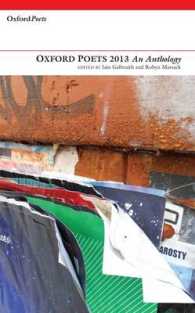Full Description
This interdisciplinary edited volume combines linguistic and memory approaches to study how people attribute meaning to the past.
It includes contributions by linguists who consider memory and its theories, and by memory scholars without linguistic background who look at sociolinguistic methods and concepts.
The book is divided into three parts and includes case studies from countries including Belgium, Chile, Cyprus, India, Italy, Poland and Sri Lanka. The first part considers ways in which memory scholars might reach out to discourse analytical and other sociolinguistic methods to make sense of a variety of memory phenomena. The second considers cutting-edge linguistic research which reaches out to memory scholars and their body of theories. The final section centres on how language itself can be studied as a 'site of memory'. Its symbolic power is salient for communities to make sense of continuities between past, present and future.
In addition to offering relevant theoretical recombinations and concrete methodological ways forward, the chapters indicate the different scales that come into play in this type of research, and what is at stake. The case studies from each chapter vary from the intimate, such as oral histories in the family setting and the difficult work of translators for asylum seekers, to the networked contexts of diasporic internet fora, and the grand-historical scale of the role of heritage in long-standing territorial disputes, as in the case of Cyprus. By bringing these scales together, readers are poised to discover new connections and instances of interscalar transfer.
This book makes a powerful case that the connections between language and memory are crucial across cultures and at different scales.
Contents
Introduction: Setting the scene, Natalie Braber (Nottingham Trent University, UK), Thomas van de Putte (King's College London, UK) and Sophie van den Elzen (Utrecht University, The Netherlands)
Part I: Memory Scholars Reaching out to Linguists
1. Collective Memories, Narratives and their Representation of Wartime Collaboration, Louise Ballière (UCLouvain, Belgium)
2. 'The Words we Choose': Discursive Embeddedness of Family Memories Related to Belgian Colonisation of the Congo, Wouter Reggers (UCLouvain, Belgium)
3. The Past is Not Our Place: Discursive Constructions of Identity and Positioning in Post-conflict Situations, Samara Velte (University of the Basque Country, Spain)
4. History and Story: Narrative Compositional Elements of Group Identity States and their Role in Collective Memory, Orsolya Vincze (Pécs, Károli Gáspár University, Hungary)
5. Memory as a Dialogical and Discursive Practice, Nicolas Villaroel (Austalian National University)
Part II: Linguistics Reaching out to Memory Scholars
6. Encounters between Past and Present: Co-constructing Memories in Collaborative Narratives among Polish Immigrant Women, Dominika Baran (Duke University, USA)
7. Language, Identity and Conflicted Heritage: Two Case Studies from Cyprus, Constadina Charalambous (European University, Cyprus) and Elena Ioannidou (University of Cyprus)
8. Remembering Together: Making Sense of Exile as a Family, Adriana Patino-Santos (University of Southampton, UK) and Peter Browning (UCL, UK)
9. Multilingual Memory and the Disclosure of Past Experiences in Interpreter-mediated Interaction, Lotte Remue (Ghent University, Belgium)
Part III: Language as Lieu de Mémoire
10. Language as Memory, Language as Discourse: Representing the Matter of Language, Nadia Cannata (Sapienza University of Rome, Italy)
11. Linguistic Nostalgia: The 'Jecke Dictionary' as a Site of Memory, Tamar Katriel (University of Haifa, Israel)
12. In Search of the Language of Loss: An Ethnographic Study of the Siraiki Language in Migrated Families, Bhawna Khattar (Ambedkar University, Delhi, India)
13. Investigating the Fiumano Dialect as Lieu de Mémoire, Angelo Massaro (University of British Colombia, Canada)







